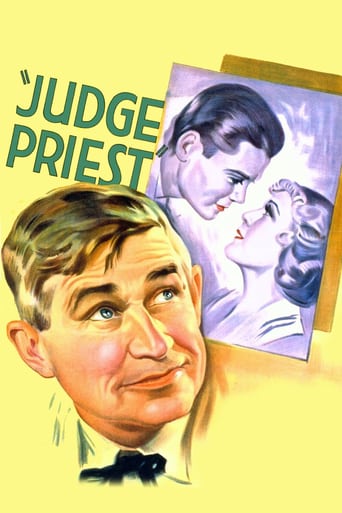ksf-2
The opening theme music is "my old kentucky home", so that gives us an idea of what's to come. Quite a long introduction card... no-one said there would be reading required! This one is all about Will Rogers, wit and writer of the day. He made a couple more after this... he died tragically quite young in a plane crash the year after making this. and Hattie McDaniel, a couple years before "Gone with the Wind". Except for the duet between Rogers and McDaniel, this one kind of drags on and on. Priest spends half the film talking to himself, or to the photo on the wall. or the horse. and it's already a post-civil-war period piece. Snoozer. never really gets going. Stepin Fetchit is at the end of the cast list, but is in just about every scene for comedic effect. Subplot of "Rome" Priest (Tom Brown) defending Mr. Gillis (David Landau), for his honor, and to win the hand of his girl. This one is interesting for history's sake, with Will Rogers starring, but other than that, it's pretty weak. Directed by multi-Oscar winner John Ford. Ford had started waaaay back in the silent films.
mercysaidno
It is a charming movie and Will Rogers is wonderful in his role as Judge Priest, but I noticed the young girl, Ellie May Gillespie played by Anita Louise, was never said to have parents who were married. According to the plot, her biological father was proved to be a Confederate hero thus making her acceptable for the judges' nephew to marry. Where is the logic in that? She was still a bastard and the boy's aunt was right. The aunt, as you might expect, was made a mockery of. It puts me in mind of Gone With the Wind. In it, Scarlett O'Hara was hard-hearted and calculating. Rhett Butler loved her but then became disgusted with her evil ways and the fact she loved another man, a married man. But Rhett's "friend", a prostitute, had a heart of gold. She was lifted up in this 1939 Academy Award Winner. Yes, here again we see movies even this far back were trying to change the Christian values of Americans and others. They were quite successful, unfortunately.
samhill5215
There's quite a lot to recommend this one, the John Ford touches mainly. The way the scenes are arranged, the attention to detail are his trademarks. His direction is tight, focused, the actors deliver their lines in a believable, realistic manner. Nothing stagy about this. As for the actors they performed pretty much as expected. Will Rogers was his usual self, not the greatest of thespians but entertaining nonetheless. Anita Louise was simply delicious. I don't think I've ever seen her in better form and I credit Ford for extracting that performance as well as Tom Brown's who managed to keep his earnestness and wide-eyed innocence under check. Even stone-faced David Landau and bombastic Berton Churchill managed to give their stereotypical parts some originality.My ambivalence is about the overt racism here, even granting the film's time frame and the period in our history it depicts. The least of it is that two of the central characters, Hattie McDaniel and Stepin Fetchit, are listed last in the credits, after Juror No. 12, whose only contribution was hitting the spittoon during the court scenes. Frankly it was difficult to watch despite some genuine tender scenes between the Rogers character and his servants. The one that stands out has him and McDaniel singing an impromptu spiritual and that one alone is worth the price of admission. The judge's relationship with the Fetchit character is much more problematic, even granting the "Coon" persona that Fetchit employed so successfully in his career he became a millionaire. There were just too many instances of the judge ordering him about just for the sake of it. It's painful to consider how humiliating it must have been for these two talented professionals to adopt their screen personae in order to earn a living.I know I'm judging this film by 21st century standards, seventy-seven years after its release and if nothing else one might say that it exposed our country's shameful past, let the sunlight in on our deep, dark, secret. And in all fairness this is a film about southerners right after they had lost the Civil War. One can't really expect them to feel and express any remorse. People don't work that way. So from that angle I have no qualms. If anything I suspect the presentation of that society was probably mostly accurate. But I wonder at the motivations of the society that felt the need to make a film such as this, about a society that existed seventy years prior. And given Ford's sympathetic, realistic, treatment of American Indians in his later Westerns I wonder if he wasn't making just that point.
mkilmer
This is warm movie with plenty of sympathetic characters. And plenty of nasty ones. A young love is threatened by a class-conscious mother, while the uncle is… well, he's Will Rogers. (The character's name is the title, Judge Billy Priest, but I suspect he's the "Will Rogers" character.) As with anything cast in the deep south in the 1890s, there are some moments and characters with which you might find yourself uncomfortable. I was taken aback by "Jeff Poindexter," portrayed by then-popular black actor Stepin Fetchit. (Fetchit has an awful, partisan political bio here at IMDb – the man deserves much better -- but he is an interesting story.) He seemed to me to be a set of overblown stereotypes, but the Judge befriends him and my wife was simply taken with him.There's a lot to like about this film, although it does drag in places. (I was surprised when the lawn party ends.) I had to smile, though, when the judge got to play lawyer, called on witness, and the universe stood still to the strains of "Dixie."


